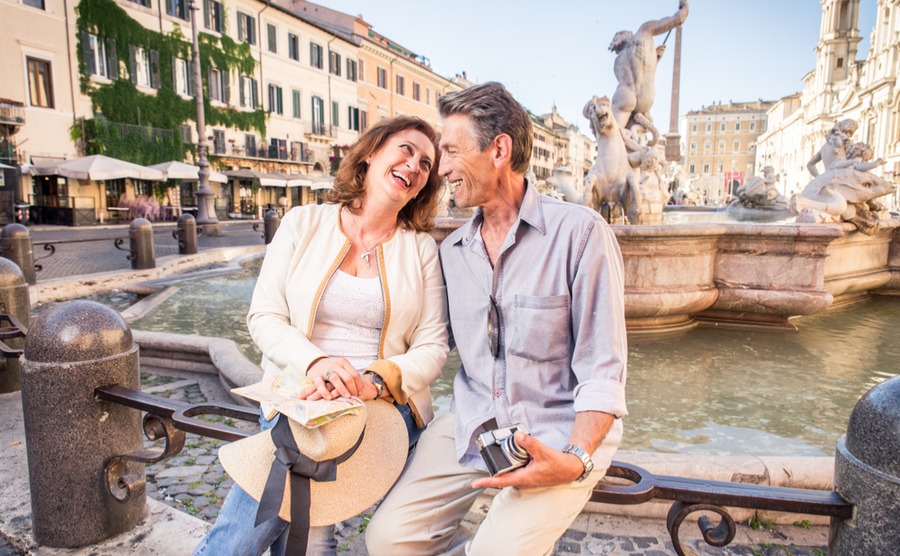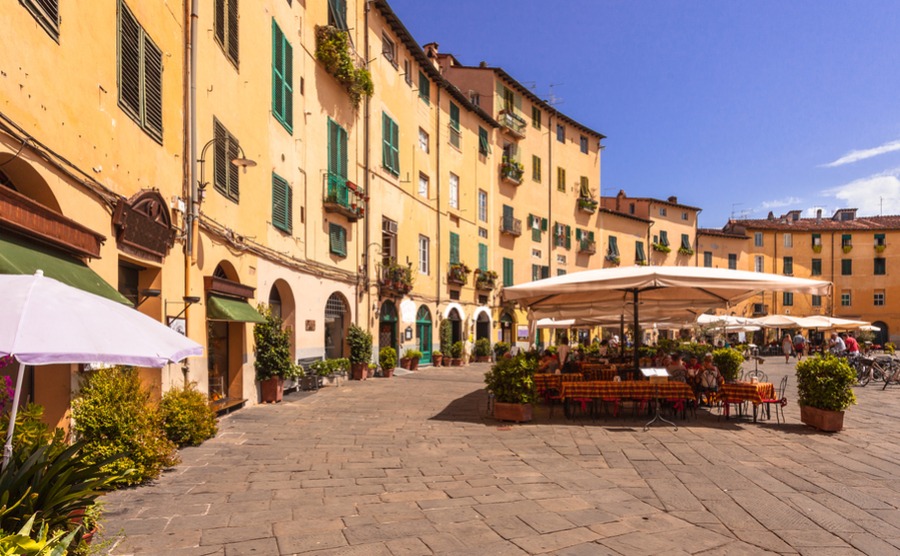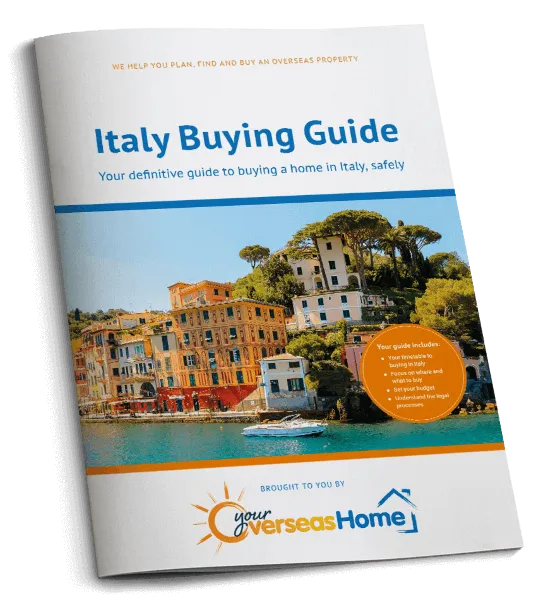Planning to retire to Italy can be both exciting and daunting, but with advice from other expats who have done it, and guidance from experts, you’re in safe hands. Before you know it, you’ll be relaxing on your own sun terrace sipping prosecco! Here are your need-to-knows to make your dream of retiring to Italy a reality.
Find homes in Italy via our property portal.
Is it the right time?
Many people say they are going to move to Italy, “whilst I’ve still got my health”, others wait until they have a health scare or reach the official retirement age. A few are even waiting for something called “Brexit”. Whatever and whenever that is. What you don’t want to be is the person who left it too late. If you have a dream, go for it, while Italy still has some very affordable properties.

Could now be your time to retire to Italy?
Stopping work can be a big life change, which can take some adjusting to. I’ve seen people take a couple of years before taking off their watch and stopping doing spreadsheets for everything. Moving house can feel like a daunting prospect whether locally or abroad. However, if you do your research, be careful whom you take advice from and chose a property that best fits your needs, the process can be very straight forward and even enjoyable.
Viewing properties, discovering new places, meeting new people, and finding a place where you can feel at home, can be exciting. Then, once you have moved in you’ll be able to decorate as you like, get new plants and explore the area. That’s got to be better than being stuck in front of the telly on a wet day in the UK.
If you do your research, be careful whom you take advice from and chose a property that best fits your needs, the process can be very straight forward and even enjoyable.
Why retire to Italy?
Italy is one of those countries that tugs at the heartstrings. One visit is never enough, as there is so much to see. You could easily spend your whole retirement visiting all the historic towns and villages, UNESCO world heritage sites, art cities, national parks and beaches. The people have a healthy zest for life and yet the pace is very chilled and laid back. Food, family and friends always come before work. The strong family ties create a community atmosphere where young people respect the older generation. All ages can be seen enjoying an evening out together, and I’ve never seen a drunk Italian.
Religion, tradition and local produce pay a big part in the Italian cultural offering. Throughout the year there are numerous events from religious festas to food sagres. In Italy it’s easy to stay healthy when your eating fresh local produce and get plenty of fresh air and exercise. Travelling throughout the country is made easy by a good road and rail network, with low train fares and cheap internal flights. As many regions have an international airport, it couldn’t be easier to have family and friends come to visit.
Tax advantages
Before you leave the UK, you must let all the relevant tax authorities know you are leaving the country. This is particularly important if you are self-employed, as if you don’t send in your self-assessment forms they will accrue fines. Eventually, the debt gets passed to a debt collector who will track you down where ever you are. I recommend doing it in writing and keeping a copy.
To really benefit from lower taxes in Italy it’s worth deciding, before you proceed with your house purchase, that you intend becoming a resident in Italy. If you plan to make your Italian property your main residence you will only pay 2% stamp duty when you purchase the property, as opposed to 9% for a second home (minimum €1,000).

You could find retiring to Italy gives you significant tax advantages.
Once you are a registered resident you will usually be exempt from council tax (IMU) on your main residence (except luxury homes) and only pay it on any land that comes with the property. This could be less than 150 a year in Puglia. A big difference from council tax bills in the UK. As a resident, you will also get a discounted rate on your electricity bill, so don’t forget to let them know it’s your main residence.
Waste collection tax (TARI) relates to the property size, number of occupants, and also the location. In general, taxes on countryside properties are less than in the cities, as you don’t get bin collection from your door, street lighting, pavements etc. Northern cities and popular tourist areas are likely to charge more than in rural areas and villages, particularly in southern regions.
As well as the sun and sea, another good reason to move to the south is a new Italian Budget Law for 2019 (Law no. 145/2018) which has introduced a favourable tax regime for retirees. It aims to encourage retired people living in foreign countries to move their residence to the southern regions of Abruzzo, Apulia, Basilicata, Calabria, Campania, Molise, Sardinia or Sicily. One condition is that you set up residence in a town with a population less than 20,000.
According to the new provisions, all income sourced outside Italy will be subject to a 7% substitutive tax, which will apply for 5 years. However, after that time it will revert to the normal tax rate, ranging from 23% on income up to €15,000 to 43% on income over €75,000.
Anyone with a high net worth should speak to their financial advisor about Italy’s tax incentives for wealthy individuals who choose to relocate to Italy. You may be able to get a flat rate income tax charge of €100,000. For a further €25,000, the tax exemption could even be extended to a family member.
Speak to an Independent Financial Advisor for impartial advice on buying property in Italy.
How to set up living in Italy
You need a tax code (codice fiscale) available from Agenzia delle Entrate. Your estate agent should be able to point you in the right direction. Once you have the tax code you’ll be able to open a bank account and proceed with your house purchase.
Residency is relatively easy to apply for. If you’re staying more than three months, you need to apply at your nearest town hall (Comune – Ufficio Anagrafe). In the case of a retiree, you will need to provide documentation proving that you have sufficient economic resources to support yourself as well as personal health insurance. In my experience the cheapest health insurance can be found through local agents in Italy. For example, Cattolica Assicurazioni offer low cost basic health insurance for under 200 p/a with prices going up depending on the extent of cover you choose.
For more advice about the legalities of purchasing a house in Italy, get guidance from one of our partner trusted lawyers.
Currently, Non-EU citizens must apply for a “permit to stay” or Permesso di Soggiorno whilst EU citizens need a Certificato di Residenza, for which you are issued a Carta D’Identita. Obviously, the Brexit outcome may alter the name of your residence permit, but the requirements should basically stay the same. The Italian government have made it clear that foreigners are very welcome to buy property in Italy and retire here. The Americans and Australians, as non-EU citizens, have been happily doing so for years. For more information see my previous article, How to get a residence permit in Italy.
Healthcare
Once you have your residence permit you’ll be able to apply for a Tessera Sanitaria card (Italian Health Insurance Card) which will give you the same health care services as local Italians at the same prices. Italy has a great number of family doctors and you can usually get in to see them very quickly. Their service is free, but if you are referred to a specialist or for tests you will pay a ticket price at the CUP desk of the hospital. These are low contributory rates set by each local authority, so they do vary. As an example, I have paid €18 for a blood test and €46 to see a specialist.
Find out more about accessing medical attention overseas with our Healthcare Guide.
The Italian healthcare service is very good, particularly in the major cities. Milan hospitals have a particularly good reputation, making the Lombardy region an excellent retirement choice for those concerned about healthcare. You are also more likely to find an English-speaking doctor in the cities that are already home to expats. Although you may be fit and healthy now, illnesses and accidents can happen at any age, so when looking at countryside property you should consider distances to doctors and hospitals.
Pensions
How to collect your state pension abroad
You can claim State Pension abroad if you’ve paid enough UK National Insurance contributions to qualify. If you live part of the year in Italy you must choose which country you want your pension to be paid in. Your State Pension can be paid into, a bank in Italy or a bank or building society in the UK. You should be aware that in Italy you will be charged income tax on your pension. You should report changes (such as a change of address or bank details) to the International Pension Centre (IPC) by contacting them by phone or in writing.
If you choose to have your pension paid into a UK account and then regularly transfer some to Italy this amount will be affected by currency exchange rates. To avoid receiving varying amounts each month, speak to Smart Currency Exchange about setting up a “Forward Contract”. This helps you to lock in an exchange rate for up to a year, so you always know what rate you’ll be trading at, and how much will be coming into your account.
If you have been working in Italy you can apply to the Italian National Social Security Institute (Istituto Nazionale Previdenza Sociale or INPS). If you have worked in numerous different EU countries, you may have gained pension rights in each of them. This means you’ll have to apply to the pension authority in the country where you currently live or where you last worked. This country will be responsible for dealing with your claim and collecting records from all the countries you have ever worked in.
Setting up a bank account
As the local currency in Italy is euros, you will want to open an Italian bank account for paying bills. Bank charges on Italian bank accounts can be quite high. Always, ask about bank charges and shop around for the most suitable account for your needs.
When sending over money from the UK to Italy, it’s often best not to use your bank – they will just send it on the day, without thinking about the risk of suddenly changing exchange rates. Read the Property Buyer’s Guide to Currency to find out more.
You may be used to using your credit/debit card for every little transaction, but in Italy you will find many Italians prefer to deal in cash. Just be aware that it is the legal responsibility of both the seller and buyer to have a receipt. Hence market stall-holders having tills, which they turn on when the police are doing their rounds. I’d recommend also keeping your UK bank account open, as it can be very useful for online gift shopping and booking flights. As UK banks require a UK address they are not easy to reopen if you change your mind later.
Working during retirement
You may have retired from one job, but you can work, if you want to. Now is the time to do projects you have been wanting to do for years. Such as, moving to Italy! Just the process of moving will keep you busy for a while. This might also involve doing work on your new home and garden. You might also decide to do a project that makes you some extra income, such as holiday rentals, art, writing or teaching. This is often the case for those who have taken early retirement and want to keep busy. It’s also a good way to meet people.
Give your friendly Italy specialists in the Resource Centre a call on +44(0)20 7898 0549 for further guidance or send us an email at [email protected].
Where to retire in Italy
Italy has something for everyone. Tuscany and the Italian Lakes are both excellent locations to retire to. They have English speaking expat communities and a good infrastructure. Florence and Lucca are both popular towns, but if you want more house for your money, take a look at the outskirts of any large town in Italy.

Lucca is one of the most popular areas to retire to Italy in.
Even if you dream of living in the countryside you will need to visit town sometimes, so it’s worth finding a town you like and then looking on the outskirts of that. Also, keep in mind how far it is from transport links and a hospital. You may be fit now but you should consider how you’ll feel about stairs and a large garden in 20 years’ time. That top floor apartment with the pretty roof terrace might not be so appealing once you’ve lugged your shopping up those stairs a few times, and that remote farm house with all the land may become hard work to maintain.
The wealthier Northern regions have a reputation for being more organised and stylish than the south, but the rural southern regions have more sunshine and relaxed friendly people. If you stay fairly close to the main provincial towns, you should have no trouble finding all the amenities you need.
Wherever you choose to retire to Italy, I feel sure you will love it. Even the people that take longer to adjust to the retirement lifestyle end up appreciating how lucky they are to live in such a beautiful place.

The process of buying property in Italy is significantly different from here in the UK. This is why we’ve created our completely free Italy Buying Guide, to provide those dreaming of a new life in Italy with all of the practical, legal, and financial information needed to help them realise that dream.









